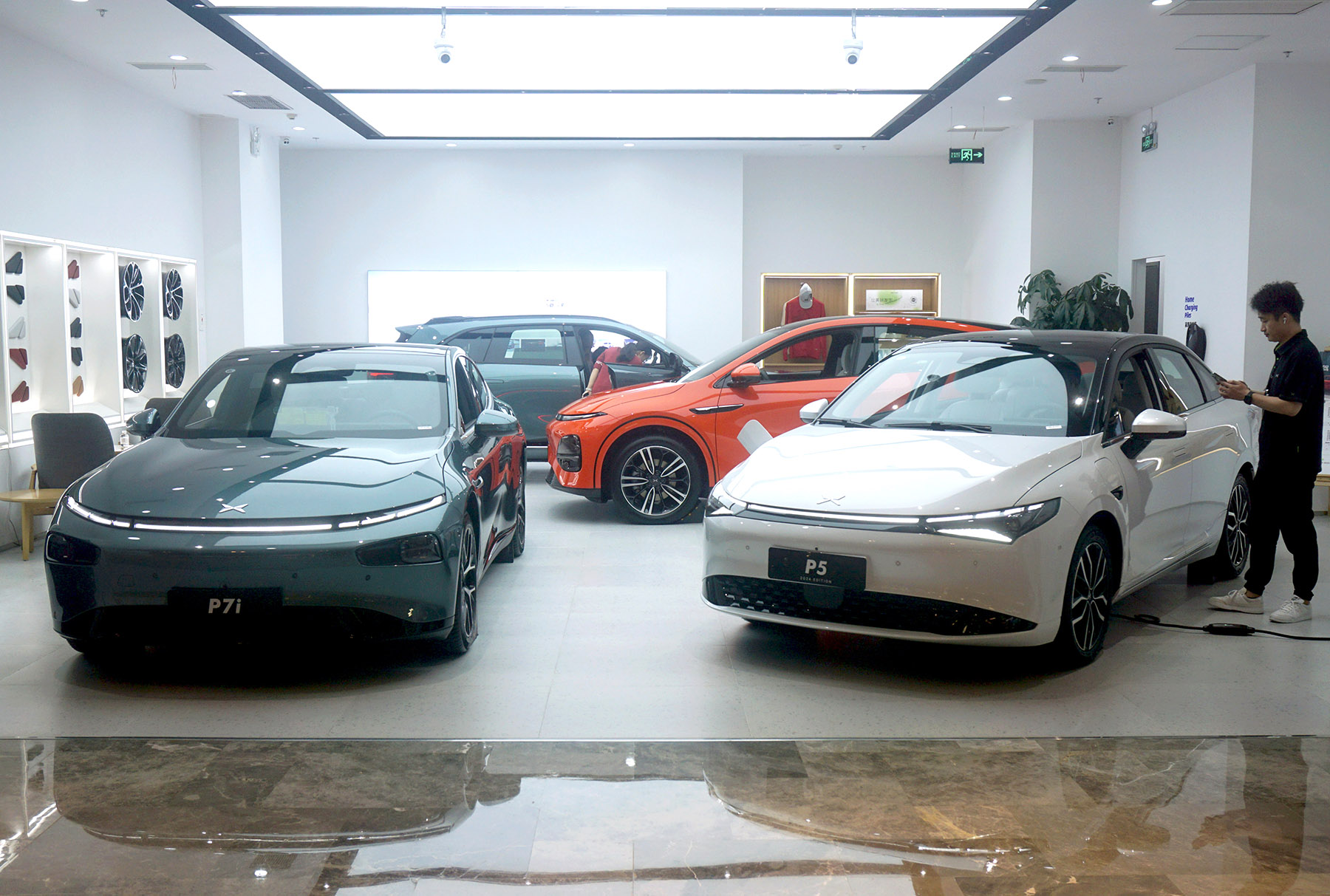European companies among those seeking collaboration for best hardware and software

Global carmakers from Volkswagen and Stellantis are reaching out to Chinese electric vehicle companies to help boost their competitive edge as the sector is shifting toward electrification.
This shows that Chinese EVs' popularity in both China and overseas markets lies in their know-how instead of overcapacity or subsidies, which the European Union has accused.
Volkswagen said on Wednesday it is codeveloping an electrical/electronic architecture with Chinese startup Xpeng in an effort to improve its competitive edge in China's heated EV market.
READ MORE: NEV makers encouraged to speed up overseas development
The architecture, which will be available in 2026, will ensure the rapid expansion of digital services in the Volkswagen brand's China-specific vehicles, thus improving the appeal of the German carmaker's products.
Currently, China's popular new energy vehicle models come from primarily local Chinese marques, such as BYD as well as startups including Nio and Xpeng.
Ralf Brandstaetter, member of the board of management of Volkswagen for China, said: "This (partnership) increases efficiency, optimizes cost structures and accelerates the speed of development.
"High cost-effectiveness and a fast pace of development are crucial for our competitiveness in China's dynamic market environment," he said.
The announcement of the new collaboration with Xpeng follows an investment of 2.5 billion euros ($2.67 billion) in China earlier this month.
The investment will be spent on expanding its production and innovation hub in Hefei, Anhui province, said Volkswagen.
It said the new production and development hub in Hefei will bring technologies to market around 30 percent faster in the future.
"This additional investment in the site underlines our ambition to quickly expand our local innovation strength," said Brandstaetter.
The investment is also to be spent on preparing the production of two models codeveloped with Xpeng, as part of a deal the two signed in 2023.
The first model will be a mid-size SUV, whose production is scheduled to start in 2026 at Volkswagen Anhui, one of the carmaker's latest Chinese joint ventures.
Also last week, Yin Tongyue, chairman of Jaguar Land Rover's Chinese partner Chery, said two European premium brands are showing interest in the carmaker's electric vehicle platform.
"One is soon to sign the deal and the other is in talks with us," said Yin.
The two European brands are likely to be Maserati and Alfa Romeo, reported National Business Daily.
Analysts said it is cost-effective and quicker to purchase EV platforms from Chinese carmakers, who have been leading the sector, than to develop them from the scratch.
The deals and talks over cooperation with Chinese EV makers are in stark contrast to the accusations from the European Union and the United States about China's overcapacity in the automotive sector.
China's auto industry continues to improve technology and production efficiency, with advancements in electrification and intelligence, which will transform into unique advantages, said Ma Yingying, an assistant research fellow at the Institute of World Economics and Politics of the Chinese Academy of Social Sciences.
Ma said the technological advancements in new energy vehicles, the advantages of industry and supply chains, and innovations and applications in intelligence have strengthened the position of China's auto industry in the global market.
Global carmakers' interest in China's EV technology did not start this year. Stellantis, which owns brands from Peugeot and Citroen to Maserati and Alfa Romeo, joined hands with Chinese startup Leapmotor in 2023.
Stellantis said it intends to leverage Leapmotor's innovative, cost-efficient EV ecosystem in China to help meet its electrification targets, with the possibility they will explore mutually beneficial synergies.
The European car giant is investing more than 50 billion euros over the next decade in electrification so that all of its passenger car sales in Europe will be electric and 50 percent in the US are electric by 2030.
ALSO READ: Ministry: Chinese NEV makers encouraged to develop overseas markets
Leapmotor was one of the world's first companies to implement Cell-to-Chassis technology on a large scale. Its centrally controlled new electric and electronic architecture achieves a seamless and efficient connection with the core components of smart EVs.
Toyota, the world's largest carmaker by sales, has changed its business campaign in China into "with China" from "for China".
The Japanese carmaker has said it will announce partnerships with major Chinese technology companies at the Beijing auto show, which is due to begin on Thursday.
There are reports that say Toyota is joining hands with Huawei and Chinese startup Momenta to adopt their advanced driving-assist solutions, which are commonplace among new cars in China.
Toyota is using Huawei technology in its new Camry sedan available in China, including the operating system it has codeveloped with the Chinese technology giant.


